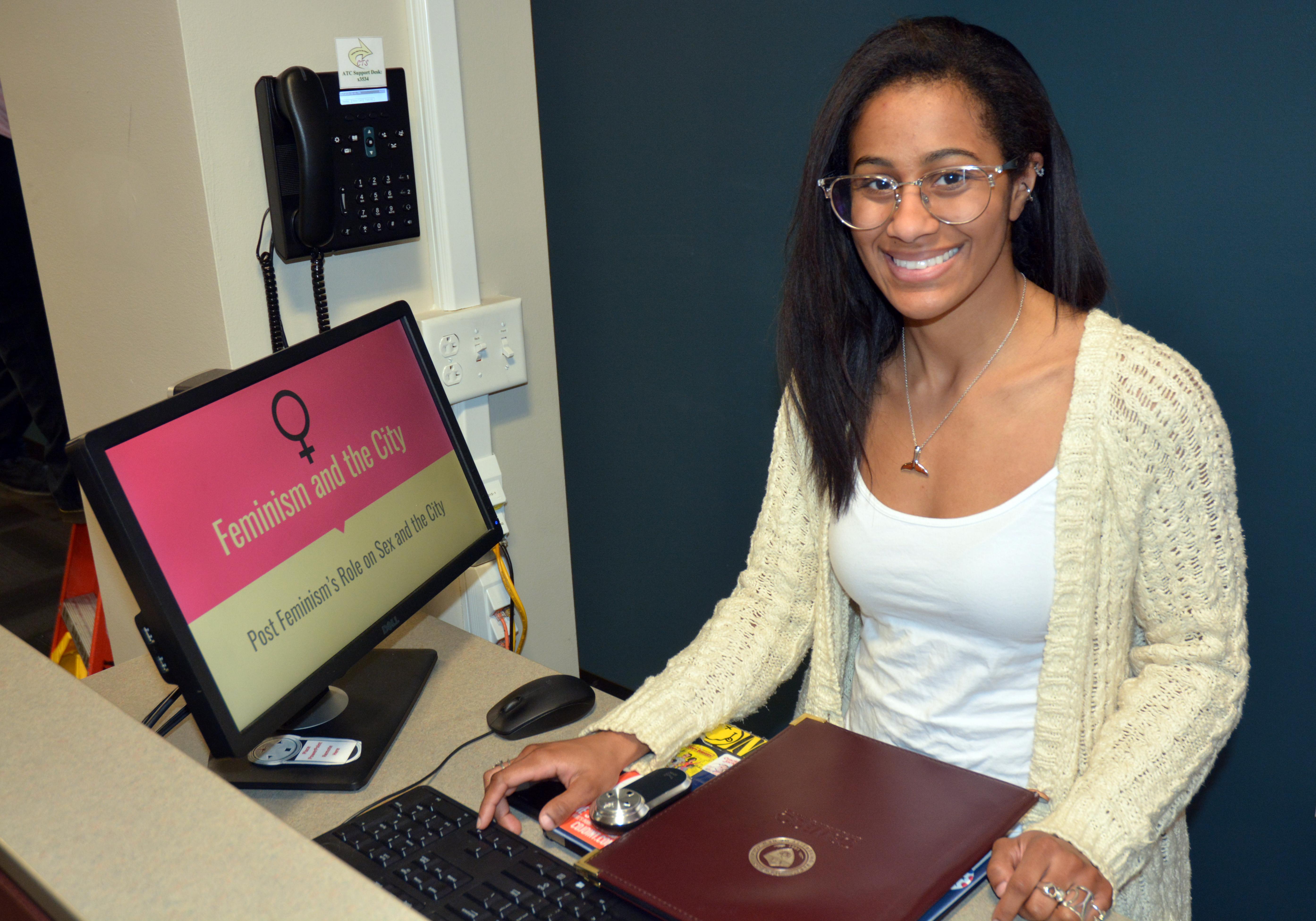Race and feminism -- Tahirah Abdo, a SUNY Oswego senior broadcasting and mass communication major, prepares to present her scholarly paper on "Sex and the City" on April 3 at the college's annual Quest symposium.
Quest will provide a showcase Wednesday, April 3, for hundreds of scholarly and creative pursuits, such as senior broadcasting and mass communication major Tahirah Abdo's presentation on femininity and the absence of people of color in the television show "Sex and the City," still popular on a variety of media.
The college's annual symposium will run from 8 a.m. to 5 p.m. in venues across campus, taking the place of classes that day. A kickoff celebration -- featuring a poster session and reception -- is scheduled for 5 to 7 p.m. April 2 at SUNY Oswego's Syracuse campus.
Abdo chose to explore race and gender in the 1998-2004 HBO series "Sex and the City," because she loves the show but can see its flaws.
"'Sex and the City' deals with agents of post-feminism when we see the characters of Carrie, Samantha, Charlotte and Miranda are all in successful and powerful positions typically held by men," said Abdo, who is from the same big city, New York, as the characters. "When I saw this, I knew I needed to start a conversation."
Even in a show that aimed to be inclusive of the feminine agenda, it read as not inclusive enough, glossing over people of color, Abdo said. The show chronicled the lives and friendships of four white, upper-middle-class women.
That leaves room for criticism and further dialogue on matters of race and gender in not only media, but in everyday life, she said.
"For me, when I watch the show and I’m able to distinguish why it was a conversation starter on topics that otherwise were going unnoticed, I asked myself, 'Do we have enough rights?'” said Abdo.
Setting the stage
Her findings on the subject of race and gender in "Sex and the City" led to a further objective, to figure out why people of color are more likely to be treated as token characters in many shows and not as standalone or lead characters. Abdo looked to other television shows, such as "Friends," that centered on an evenly divided cast of men and women -- but not men and women of color.
Abdo wrote a paper last December titled "Feminism and the City: Post Feminism's Role on 'Sex and the City'" for the course "Children, Women and Minorities in the Media," taught by communication studies faculty member Jennifer Fogel, who suggested Abdo make a presentation at Quest, along with others in the class who focused on shows such as "Broad City," "Jane the Virgin" and "Dear White People." That session will begin at 2 p.m. in 323 Marano Campus Center
"My goal is to offer students an opportunity to present their work in a casual forum as well as to show students currently taking my course,” Fogel said.
Quest provides a forum to begin discussing issues of race and gender, Fogel said, but she added, "I think there are other, much stronger, avenues of conversing about these issues that can take place outside of the classroom -- for instance, programs that the (college's) Women’s Center puts on and some of the diversity speakers we’ve had on campus.”
Abdo's paper concludes that "Sex and the City" ultimately did not prove -- as career-minded and sexually liberated as the post-feminist main characters appeared to be -- that women have fully "made it" to equality with men. "By the cast lacking a leading minority character, it white- and class-washed post-feminism," she wrote.
Nevertheless, Abdo concluded, it set the stage for other, more inclusive shows, "and gave Samantha, Carrie, Charlotte and Miranda a voice they already had in their head."
Besides student, faculty and staff presentations, Quest will feature a session for scholarly and informative posters in Marano Campus Center arena, a Graduate Studies competition titled 3-Minute Thesis in 132 Marano (the auditorium), an art department showcase in 114 Marano and many related events, such as the staged reading of a student-written play, the annual Creative Writing Awards, an honor society induction and much more.
For more information on Quest, including a link to the Attendify app that will be in use to help symposium-goers organize their day, visit the Quest website.




